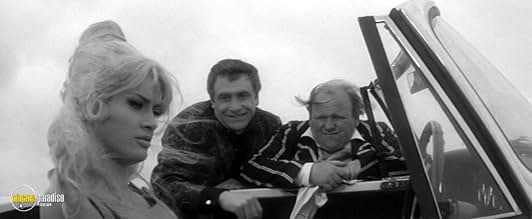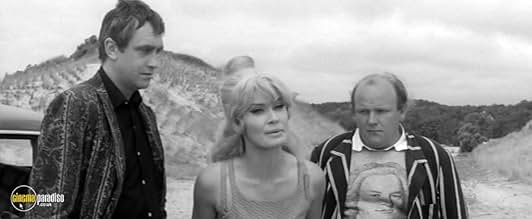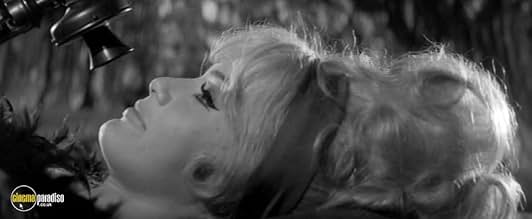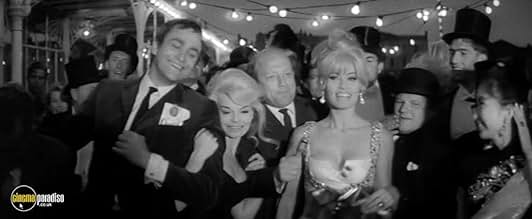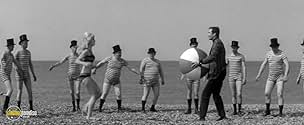IMDb-BEWERTUNG
6,0/10
475
IHRE BEWERTUNG
Füge eine Handlung in deiner Sprache hinzuA drab little English seaside town tries to improve its image--and increase its revenues--by holding a film festival. When a famous continental star agrees to attend, things get out of hand.A drab little English seaside town tries to improve its image--and increase its revenues--by holding a film festival. When a famous continental star agrees to attend, things get out of hand.A drab little English seaside town tries to improve its image--and increase its revenues--by holding a film festival. When a famous continental star agrees to attend, things get out of hand.
Jim Brady
- Film Festival Patron
- (Nicht genannt)
Billy Dean
- Film Festival Patron
- (Nicht genannt)
George Fisher
- Film Festival Patron
- (Nicht genannt)
Claire Gordon
- Angelina
- (Nicht genannt)
Juba Kennerley
- Film Festival Patron
- (Nicht genannt)
Lucille Soong
- Starlet
- (Nicht genannt)
Empfohlene Bewertungen
This is one of a dozen efforts I will be watching in tribute to its late controversial director, whose big-screen debut the film was. Actually, he started off his cinema career with two uncharacteristic movies (the second being the "Harry Palmer" adventure BILLION DOLLAR BRAIN {1967}): this one, then, is a farce which, at least, comes up with an original premise (a small British seaside resort contriving to augment its inexistent tourist industry by organizing a Film Festival and inviting a Brigitte Bardot-type siren to be the guest of honor) – even if, in retrospect, the general lack of discipline on display would soon become a mainstay in Russell's work, it is the would-be fashionable technique adopted throughout (a remnant of the "Swinging Sixties" fad just then taking sway) which dates it most of all! Having said that, the harsh cinematography (by the stalwart Ken Higgins) is very typical of its era – though the panned-and-scanned TV-sourced copy I watched did the film's look no favors at all!; in addition, Georges Delerue's score is pleasantly evocative.
As for the cast, it may be second-rate but proves undeniably enthusiastic: leading man James Booth seemed to divide his time between serious and lighter fare but nevertheless comes across as a bit forced here in the role of the deck-chair attendant who comes up with the idea for the much-needed economic boost (initially, the Mayor is almost offended that he should even deign him the time of day, let alone take heed of his suggestion!) – the town's notion of an event had earlier been restricted to a dismally-attended skating competition in fancy dress!; rotund Roy Kinnear is predictably buffoonish as the eager but gawky bureaucrat; Marisa Mell (replacing Annette Stroyberg, who withdrew due to illness) does well in the first of her only 2 films – the other being Basil Dearden's espionage romp MASQUERADE {1965} – made outside the "Euro-Cult" spectrum in which she later thrived; Alita Naughton, too, is a delight in her only theatrical film (she would drop off the radar completely in a couple of years' time!), bafflingly decked-out in sailor's outfit(!) as a teen journalist whom Booth 'plays' with but forsakes as soon as Mell turns up; Bryan Pringle, a prolific character actor here in something of a showcase as the lecherous Mayor (shown watching pornographic slides in his office!) and ingratiating himself with Mell at every turn; and Sandor Eles as Mell's agent who prides himself of having fabricated her alluring image but scoffs at the sex kitten's wish to flex her acting muscles.
The film's most notable set-pieces involve a parade disrupted when the pier from which both Mayor and starlet are watching slides out to sea, the Film Festival itself – highlighting the spoof of a French art-house pic – which turns into a melee' when some puritanical locals object to smut being projected (with people even ripping through the screen via the mouth of Mell's enlarged image!), and the concluding nudist beach inauguration (for which the journalist impetuously decides to replace the actress after the latter has left in disgust, with Kinnear making a desperate run to the train station in vain in order to retrieve her). For what it is worth, the comedy would like to hark back to the Slapstick heyday of the 1920s (with one rather nice nod to Laurel and Hardy) but the end result is decidedly patchy and, in any case, owes more to the vulgar "Carry On" brand then in full force!
As for the cast, it may be second-rate but proves undeniably enthusiastic: leading man James Booth seemed to divide his time between serious and lighter fare but nevertheless comes across as a bit forced here in the role of the deck-chair attendant who comes up with the idea for the much-needed economic boost (initially, the Mayor is almost offended that he should even deign him the time of day, let alone take heed of his suggestion!) – the town's notion of an event had earlier been restricted to a dismally-attended skating competition in fancy dress!; rotund Roy Kinnear is predictably buffoonish as the eager but gawky bureaucrat; Marisa Mell (replacing Annette Stroyberg, who withdrew due to illness) does well in the first of her only 2 films – the other being Basil Dearden's espionage romp MASQUERADE {1965} – made outside the "Euro-Cult" spectrum in which she later thrived; Alita Naughton, too, is a delight in her only theatrical film (she would drop off the radar completely in a couple of years' time!), bafflingly decked-out in sailor's outfit(!) as a teen journalist whom Booth 'plays' with but forsakes as soon as Mell turns up; Bryan Pringle, a prolific character actor here in something of a showcase as the lecherous Mayor (shown watching pornographic slides in his office!) and ingratiating himself with Mell at every turn; and Sandor Eles as Mell's agent who prides himself of having fabricated her alluring image but scoffs at the sex kitten's wish to flex her acting muscles.
The film's most notable set-pieces involve a parade disrupted when the pier from which both Mayor and starlet are watching slides out to sea, the Film Festival itself – highlighting the spoof of a French art-house pic – which turns into a melee' when some puritanical locals object to smut being projected (with people even ripping through the screen via the mouth of Mell's enlarged image!), and the concluding nudist beach inauguration (for which the journalist impetuously decides to replace the actress after the latter has left in disgust, with Kinnear making a desperate run to the train station in vain in order to retrieve her). For what it is worth, the comedy would like to hark back to the Slapstick heyday of the 1920s (with one rather nice nod to Laurel and Hardy) but the end result is decidedly patchy and, in any case, owes more to the vulgar "Carry On" brand then in full force!
Amusing 1960s innocence with Ken Russell twists. Experimental Hit and miss as with a many films and the arts at such a creative time.
A special title: I had to go across the pond to retrieve it! Because this film has never been released on home video in the US, I bought the film on eBay in the UK and shipped it to my friend Darren in Scotland, who ripped it into a Quicktime file to send to me. I would safely say it is the most difficult film to acquire I have ever tracked down!
First, the negative: this process caused a messy, glitchy version of the film that was admittedly harder to watch. I could handle it, but I wouldn't show this copy to friends unless they were warned. It makes the case for why having restorations and good quality picture matters.
Nonetheless, the feature debut of Ken Russell is truly a delight. It's a short and sweet 80 minutes and impressively has a fair share of humor and stylistic wow moments. He knows how to create beauty and wonder in cinema form like few other filmmakers I've ever seen. Despite its reputation as being Russell's least innovative project (had to start somewhere) it still has a few brilliant set pieces and photography to ogle at (not even just of the bikini-clad movie star). I laughed out loud, I was moved by some of its beauty. There's something to this late-era black and white that's really magnificent. You can see it as a contemporary to "A Hard Days Night," released the same year to much greater success. Some of its humor has aged, some of it remains relevant today toward the objectification of women, especially in regards to how it is shown in film. And it's surprisingly blunt at times, perhaps this is why it's been impossible to find in the US.
I hope to one day see this movie again in a proper restoration, or at least the unpixelated version as described. Yet despite some visual setbacks, I could still relish in 'French Dressing' and can't wait to see the next entry in Russell's filmography.
First, the negative: this process caused a messy, glitchy version of the film that was admittedly harder to watch. I could handle it, but I wouldn't show this copy to friends unless they were warned. It makes the case for why having restorations and good quality picture matters.
Nonetheless, the feature debut of Ken Russell is truly a delight. It's a short and sweet 80 minutes and impressively has a fair share of humor and stylistic wow moments. He knows how to create beauty and wonder in cinema form like few other filmmakers I've ever seen. Despite its reputation as being Russell's least innovative project (had to start somewhere) it still has a few brilliant set pieces and photography to ogle at (not even just of the bikini-clad movie star). I laughed out loud, I was moved by some of its beauty. There's something to this late-era black and white that's really magnificent. You can see it as a contemporary to "A Hard Days Night," released the same year to much greater success. Some of its humor has aged, some of it remains relevant today toward the objectification of women, especially in regards to how it is shown in film. And it's surprisingly blunt at times, perhaps this is why it's been impossible to find in the US.
I hope to one day see this movie again in a proper restoration, or at least the unpixelated version as described. Yet despite some visual setbacks, I could still relish in 'French Dressing' and can't wait to see the next entry in Russell's filmography.
Hadn't it been for Brigitte Bardot , Saint-Tropez would have been another season resort among so many others on the French Rivieira.
An English sea resort is deserted ; all the deckchairs are empty and the young man who is in charge of them has a good idea :during the film festival ,a female French actress could attract a lot of people and help the place become a big touristic draw; as BB was unavailable -or probably too expensive - they choose an ersatz ,Françoise ; there's the rub :although she's got a BB hairdo and tries to imitate her swagger ,she's Austrian Marisa Mell who has got no French accent at all and does not utter a single word in her first language : a French actress with un petit je ne sais quoi nohow .Blonde Mylène Demongeot would have been a much better French sex symbol, if they were not able to afford BB...
This black and white film, often recalling burlesque of the silent era ,may disappoint Ken Russel's fans ; one scene,however , may herald his future frenzy: on the screen ,a giant mouth "swallows" all the men in the audience .
An English sea resort is deserted ; all the deckchairs are empty and the young man who is in charge of them has a good idea :during the film festival ,a female French actress could attract a lot of people and help the place become a big touristic draw; as BB was unavailable -or probably too expensive - they choose an ersatz ,Françoise ; there's the rub :although she's got a BB hairdo and tries to imitate her swagger ,she's Austrian Marisa Mell who has got no French accent at all and does not utter a single word in her first language : a French actress with un petit je ne sais quoi nohow .Blonde Mylène Demongeot would have been a much better French sex symbol, if they were not able to afford BB...
This black and white film, often recalling burlesque of the silent era ,may disappoint Ken Russel's fans ; one scene,however , may herald his future frenzy: on the screen ,a giant mouth "swallows" all the men in the audience .
What a heap of drivel. This early Ken Russell effort starts feebly then gets worse. It's a one-joke movie whose one joke isn't funny.
Jim is a cheeky young chap who works as a deckchair attendant for the council of Gormleigh, an imaginary holiday resort on the Kent Coast of England. Jim has a chubby friend called Henry and an American girlfriend, Judy. Judy is a cute kid who works as a journalist on the local paper, but wants to be a serious writer. Jim's brilliant idea is to galvanise tourist interest in Gormleigh by importing French sex-kitten actress, Francoise Fayol.
The single gag is the fun which arises (did I say fun?) when French sexiness meets English aldermanic pomposity. And there you have it.
Jim is played with barrow-boy chirpiness by James Booth, an actor very much in vogue at the time. The late, much-lamented Roy Kinnear is Henry, the dull and cowardly council employee who always seems to mess up. Alita Naughton makes her debut in this film, playing Judy. She is projected as the 'kooky' babe, an Audrey Hepburn for the beat generation. To the best of my knowledge, she was never heard of again.
"Dunno what you're laughing at," observes Henry at one point, and it might well be directed at the cinema audience. The humour seems to consist of getting people wet. We even have the old Walter Raleigh gag of spreading a cape over a puddle, then when the woman steps onto it she sinks up to her neck. And there is the platform of local worthies which slides into the sea. Yes, it's really as dire as that.
Merisa Mell (another starlet who didn't twinkle for long) plays Francoise Fayol. She pouts and wears bikinis. Because she is French, she says "Oh la la" quite a lot and breaks into "Gentille Alouette" when she's happy. Russell makes fun of the self-important Nouvelle Vague in 'Pavements of Boulogne', the film within a film, and Francoise's creator Vladek (Sandor Eles) seems to be a satirical thrust at Vadim.
Alita McNaughton is pretty, and Russell rather over-indulges the lingering close-ups during which she is expected to pull cute faces. She sings very nicely during her end-of-the-pier farewell to Jim and Henry, but she has little else to offer. She shows her stocking-tops twice (once, unaccountably, after removing a pair of jeans) - and it is twice too often for such a totally un-voluptuous woman.
The film falls between two stools. It fails as an old-fashioned seaside romp, and though one catches a whiff of rebellious sixties counter-culture ("What am I going to do with the flag?") it is too hidebound and middle-aged to work as a companion piece to "Hard Day's Night". Bryan Pringle was to spend the subsequent decade and more playing straight-faced comical weirdos, and he established the pattern in this film with his portrayal of the randy Mayor of Gormleigh.
Johnny Speight (whom I have always regarded as over-rated) provided additional dialogue, but whatever his contribution was, it didn't help. The 'big scene' - the riot in the cinema - is depressingly lame, in that oh-so-familiar British way.
Russell being Russell, there have to be some obtrusive auteurial camera tricks. We get bits of 'hip' sixties rapid-cut montage (the camel photos) and monotonous use of fast-motion for allegedly comic effect (Jim pedalling his bike hard, the Francoise disguise sequence, etc). Filming the boat conversation from another boat is, at least, visually interesting and in fairness to Russell the parting for France is attractively done, shifting the point of view between the pier and the ferry.
Robert Robinson appears as himself in what I can only assume was the consequence of a well-oiled Garrick Club wager.
Jim is a cheeky young chap who works as a deckchair attendant for the council of Gormleigh, an imaginary holiday resort on the Kent Coast of England. Jim has a chubby friend called Henry and an American girlfriend, Judy. Judy is a cute kid who works as a journalist on the local paper, but wants to be a serious writer. Jim's brilliant idea is to galvanise tourist interest in Gormleigh by importing French sex-kitten actress, Francoise Fayol.
The single gag is the fun which arises (did I say fun?) when French sexiness meets English aldermanic pomposity. And there you have it.
Jim is played with barrow-boy chirpiness by James Booth, an actor very much in vogue at the time. The late, much-lamented Roy Kinnear is Henry, the dull and cowardly council employee who always seems to mess up. Alita Naughton makes her debut in this film, playing Judy. She is projected as the 'kooky' babe, an Audrey Hepburn for the beat generation. To the best of my knowledge, she was never heard of again.
"Dunno what you're laughing at," observes Henry at one point, and it might well be directed at the cinema audience. The humour seems to consist of getting people wet. We even have the old Walter Raleigh gag of spreading a cape over a puddle, then when the woman steps onto it she sinks up to her neck. And there is the platform of local worthies which slides into the sea. Yes, it's really as dire as that.
Merisa Mell (another starlet who didn't twinkle for long) plays Francoise Fayol. She pouts and wears bikinis. Because she is French, she says "Oh la la" quite a lot and breaks into "Gentille Alouette" when she's happy. Russell makes fun of the self-important Nouvelle Vague in 'Pavements of Boulogne', the film within a film, and Francoise's creator Vladek (Sandor Eles) seems to be a satirical thrust at Vadim.
Alita McNaughton is pretty, and Russell rather over-indulges the lingering close-ups during which she is expected to pull cute faces. She sings very nicely during her end-of-the-pier farewell to Jim and Henry, but she has little else to offer. She shows her stocking-tops twice (once, unaccountably, after removing a pair of jeans) - and it is twice too often for such a totally un-voluptuous woman.
The film falls between two stools. It fails as an old-fashioned seaside romp, and though one catches a whiff of rebellious sixties counter-culture ("What am I going to do with the flag?") it is too hidebound and middle-aged to work as a companion piece to "Hard Day's Night". Bryan Pringle was to spend the subsequent decade and more playing straight-faced comical weirdos, and he established the pattern in this film with his portrayal of the randy Mayor of Gormleigh.
Johnny Speight (whom I have always regarded as over-rated) provided additional dialogue, but whatever his contribution was, it didn't help. The 'big scene' - the riot in the cinema - is depressingly lame, in that oh-so-familiar British way.
Russell being Russell, there have to be some obtrusive auteurial camera tricks. We get bits of 'hip' sixties rapid-cut montage (the camel photos) and monotonous use of fast-motion for allegedly comic effect (Jim pedalling his bike hard, the Francoise disguise sequence, etc). Filming the boat conversation from another boat is, at least, visually interesting and in fairness to Russell the parting for France is attractively done, shifting the point of view between the pier and the ferry.
Robert Robinson appears as himself in what I can only assume was the consequence of a well-oiled Garrick Club wager.
Wusstest du schon
- WissenswertesA number of writers worked on the script, which was constantly being rewritten during the making of the film. When the TV presenter Robert Robinson agreed to play himself in a brief cameo, he told Ken Russell he would have to write his own lines as he wasn't an actor. Russell agreed and added that he could also rewrite everyone else's lines if he felt like it.
- Zitate
Robert Robinson: Where will all of it end? Apache dancing in the Floral Halls? Absinthe in the ice-cream parlors?
- Alternative VersionenIn the release print as owned and screened by the British Film Institute, the ending sequence titles are different from the Studiocanal owned prints (available on DVD) with no credit given to actress Germaine Delbat, while a dedicated message of acknowledgment to Michael Arthur Film Productions is shown on behalf of the producers.
- VerbindungenFeatured in Sunday Night: Don't Shoot the Composer (1966)
Top-Auswahl
Melde dich zum Bewerten an und greife auf die Watchlist für personalisierte Empfehlungen zu.
- How long is French Dressing?Powered by Alexa
Details
- Erscheinungsdatum
- Herkunftsland
- Sprache
- Auch bekannt als
- French Dressing
- Drehorte
- Herne Bay, Kent, England, Vereinigtes Königreich(Doubles as Gormleigh-on-Sea)
- Produktionsfirmen
- Weitere beteiligte Unternehmen bei IMDbPro anzeigen
- Laufzeit1 Stunde 26 Minuten
- Farbe
- Sound-Mix
- Seitenverhältnis
- 2.35 : 1
Zu dieser Seite beitragen
Bearbeitung vorschlagen oder fehlenden Inhalt hinzufügen

Oberste Lücke
By what name was Versuch's mal auf französisch (1964) officially released in Canada in English?
Antwort
